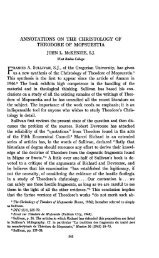SYMBOL, MYTH, AND THE BIBLICAL REVELATION AVERY ...
SYMBOL, MYTH, AND THE BIBLICAL REVELATION AVERY ...
SYMBOL, MYTH, AND THE BIBLICAL REVELATION AVERY ...
You also want an ePaper? Increase the reach of your titles
YUMPU automatically turns print PDFs into web optimized ePapers that Google loves.
<strong>SYMBOL</strong>, <strong>MYTH</strong>, <strong>AND</strong> <strong>THE</strong> <strong>BIBLICAL</strong> <strong>REVELATION</strong> 11<br />
In summary, then, we may conclude that myth, at least in the<br />
sense in which we shall use the term, is a particular type of symbol.<br />
It is a symbolic narrative which deals with events attributed to superhuman,<br />
personalized agencies. These events, unfolding in a time<br />
above that of our experience, are conceived as having a profound<br />
influence on the typical occurrences familiar to us. Through the<br />
recital and cultic re-enactment of the myths which it accepts, a community<br />
feels itself delivered from the grip of cosmic forces and, on<br />
occasion, brought into union with the divine. Not all these elements,<br />
of course, will be equally prominent in every instance. There are<br />
borderline cases which it is hard to classify as myth or legend or<br />
simple tale. Some authors may wish to give a wider or narrower meaning<br />
to the term "myth" than ours. But the description given in the<br />
preceding paragraphs is not arbitrary; it has a solid basis in the usage<br />
of many acknowledged authorities and commends itself by its relative<br />
clarity.<br />
<strong>THE</strong> ABIDING VALUE OF <strong>MYTH</strong><br />
From the Enlightenment until the twentieth century, myth was<br />
generally characterized as a primitive mode of thought, practically<br />
devoid of value as an approach to truth. This point of view is reflected<br />
in the definition in the Oxford English Dictionary: "A purely<br />
fictitious narrative usually involving supernatural persons, actions, or<br />
events, and embodying some popular idea concerning natural or<br />
historical phenomena." The assumption behind all such definitions is<br />
that while primitive, prelogical men may have taken myths seriously,<br />
modern man goes to them only for entertainment or relaxation. The<br />
myth in itself says something false. If it contains a hidden grain of<br />
truth, this can and should be restated in strictly rational terms.<br />
Modern studies in fields such as depth psychology and the history<br />
of religions have brought about a far-reaching rehabilitation of myth.<br />
It is rather commonly regarded today as a distinct mode of knowledge<br />
which can never be adequately reduced to rational discourse. Some<br />
contemporary thinkers, under the influence of a Kantian epistemology,<br />
stress chiefly the value of myth in the subjective order. Cassirer, for<br />
instance, considers that it registers states of soul which cannot be
















